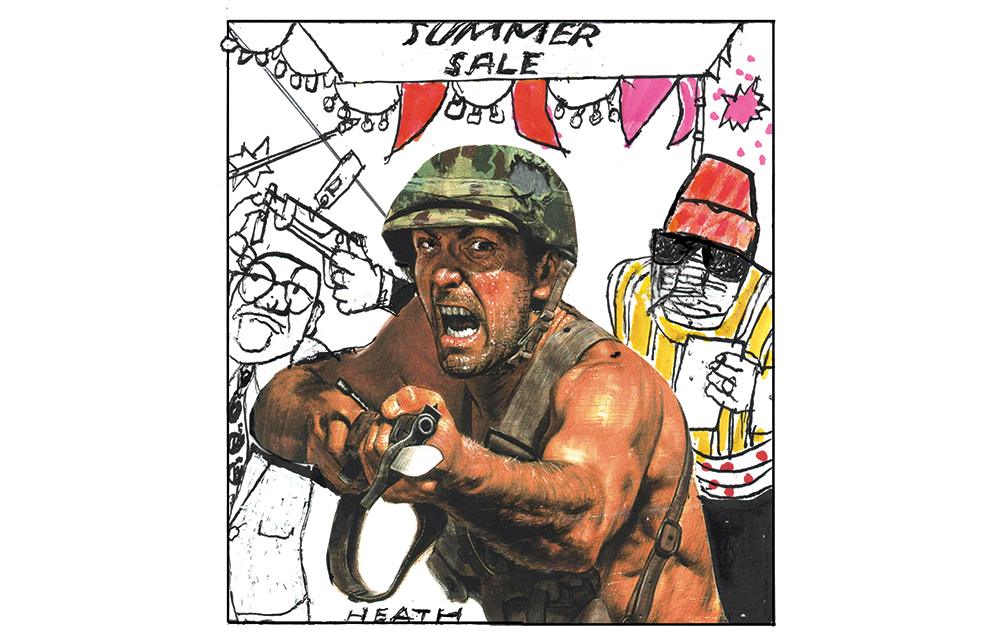‘Yalla! Yalla! Yalla!’ shouts a Saudi man. There are arms dealers, fixers, military men and gun geeks; tanks, assault rifles, mortars and drones. Jets do aerobatics overhead and a band plays Maroon 5. A Chinese robot dog bangs into delegates. Welcome to the International Defence Exhibition in the United Arab Emirates. Business is booming. On the conference floor, Erik Prince is talking to the Emirati President, Mohamed bin Zayed. People are taking photos of MBZ, who smiles out from a dark robe and aviator sunglasses, but no one seems to recognise Prince. He’s an ex-Navy Seal who sold mercenaries to the Americans in Iraq, trained Somalis to fight pirates in the Gulf of Aden, and allegedly broke arms-trafficking laws shipping weaponised agricultural planes to Libya. After some of his mercenaries killed 17 Iraqi civilians in 2007, he left America for the UAE. He became friends with MBZ, they fell out, and now they’re close again. Prince makes deals happen: he’s valuable.
Each exhibitor at the fair has a stand with their weapons on display. Guns are mounted to counters like iPads in John Lewis. You can pick them up, but they’re attached to a thin wire that ties them down. People yank back the bolt and pull the trigger, over and over. There are shooting ranges outside the conference for buyers to try the guns properly. Small companies do business at the back of their stand, with a table, chairs and a bowl of mints. Big companies have two floors of private meeting rooms and some have a buffet. Most of the salesmen are useless. A hapless pair from Norinco, a Chinese defence company, say they’ve never heard of a microchip, and a man from Turkey can’t remember who his customers are. ‘I just sell it. I don’t ask these questions.’ Three salesmen from a British company are sitting around. One stands and bends over to pick something up. Another slaps his bottom. Everyone laughs. At one point, Nicola Bandini, the Italian CEO of Lahab Light Ammunition, an Emirati firm, snaps at his incompetent colleagues who are having trouble transporting weapons: ‘I will drive the guns to the airport in my car!’ He hits the back of one hand into the palm of the other. The team look forlorn.
Some business manages to get past these salesmen. Everyone wants 155mm howitzers, an artillery munition. Countries have given their stockpiles away to Ukraine and need to top them up again. A Czech manufacturer says they can’t make them fast enough. Manufacturers from countries that are neutral in the war are profiting too. The Bulgarians won’t sell directly to Ukraine because their government is against it, so they sell to Ukraine’s allies, who can do what they want with the weapons. A South Korean manufacturer sells 155s and munitions that are compatible with the western tanks in Ukraine. Customers can send artillery bought somewhere else to Ukraine and top up their own stockpiles from South Korea.
Russian companies are exhibiting in a small pavilion away from the conference hall. Turkish Bayraktar drones and an American Patriot missile system are on display nearby. Patriots were first used in Iraq to take out Saddam Hussein’s Soviet Scud missiles. Russia replaced Scuds with Iskander ballistic missiles, and has used the Iskanders in Ukraine. The US has promised Ukraine a Patriot system to shoot them down. ‘We haven’t had any confrontation. We just give each other weird looks,’ says an American soldier standing by the Patriot. A Ukrainian exhibitor says their embassy paid to make sure the Russians were out of the way, but still the Russian stand is busy. Algerian generals are briefed about S-400 surface-to-air systems, Chinese naval officers inspect model T-90 tanks, and everyone else goes mad for Kalashnikovs. AK-12s, AK-19s, AK-15s, AK-anythings. They pose for photos and grin wildly.
‘How much?’ asks a Bangladeshi military man in view of everyone, pointing at a plastic model of an Ilyushin transport plane. ‘$150 million,’ says the salesman. The Bangladeshi man is Waker-uz-Zaman, a lieutenant general. He says Russia makes ‘very good hardware’, and he doesn’t want the Bangladeshi military to be reliant on one country for its equipment. Maintaining it all is difficult, and some pieces of equipment aren’t compatible with others, but he thinks it’s the best option for Bangladesh. A Pakistani man wearing Gucci sunglasses and carrying an AK-12 introduces himself in the Russian pavilion. He’s wearing a G-Shock watch and looks like a fool. He figures out I’m a journalist and says I should interview him. He says he’s 25, called Muhammad, and sells weapons to special forces across the world. He wants to introduce me to his friends. They’re on a Pakistani naval ship, moored at the marina. On deck, we sit on white canvas armchairs that are stained with muck and eat salted peanuts from a half-finished packet. There are two helicopter pilots and someone from the UAE’s Ministry of Defence. Muhammad tries to get involved in the conversation, but they’re not interested. They’re not his friends.
When we leave the boat, Muhammad says he lives in one of the biggest mansions in Dubai. A penthouse. He says he could throw a party in my honour if I want. He’s making gold guns for politicians. He has a friend who’s a prime minister. He’ll give one to him. I don’t know if I believe him. In the end, £5 billion worth of deals were signed at the arms fair. War is good news around here. These guys keep us safe, apparently.






Comments